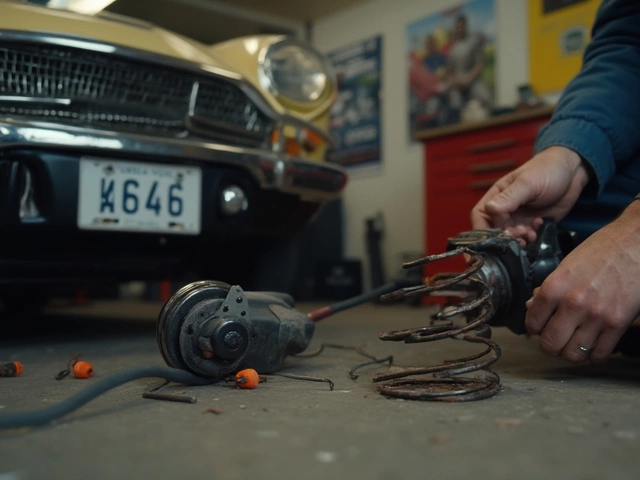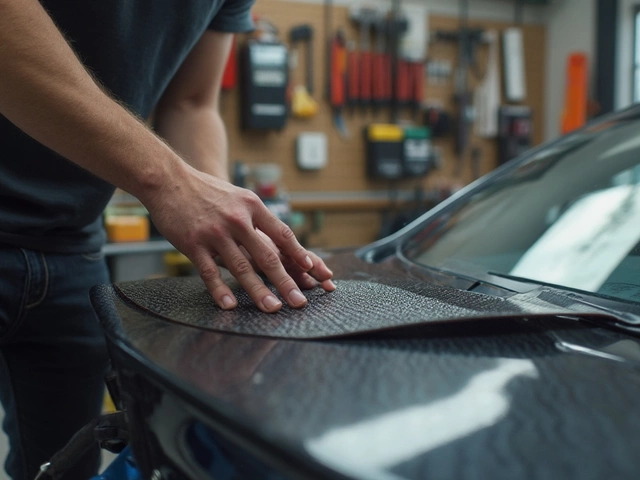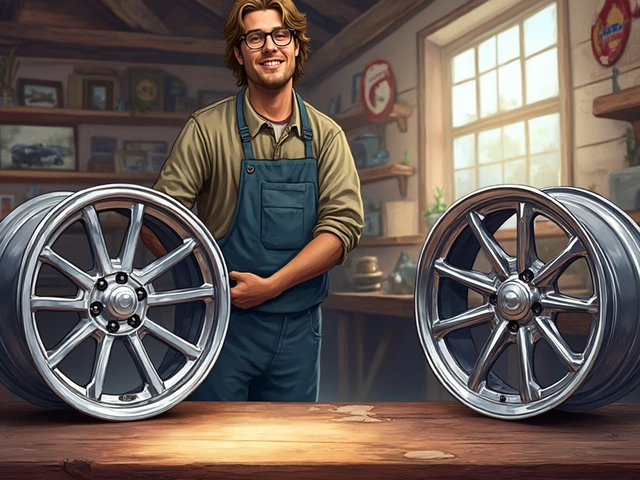Thinking about giving your ride a new look and feel? Upgrading to alloy wheels might just be the move. They’re not just for show—though they do look seriously cool in the sun. Alloy wheels have advantages that go beyond aesthetics.
For starters, they can actually improve your car’s performance. Thanks to their lighter weight compared to steel wheels, your car uses less energy to move. Simple science, right? Less weight equals better fuel efficiency and that sporty handling you might be after.
But wait, there’s more. Alloy wheels don’t just boost performance; they can also add to your car's value. Buyers love them, often seeing those shiny wheels as a premium feature. Stick with me as we dig into these perks and more in the article.
- What Are Alloy Wheels?
- The Benefits of Alloy Wheels
- Aesthetic Appeal and Styles
- Performance Impact
- Cost Considerations
- Maintenance and Durability
What Are Alloy Wheels?
So, you’re probably wondering what's so special about alloy wheels. Well, they're made from a mix of metals, typically aluminum or magnesium, unlike the typical steel wheels. This combo makes them lighter and stronger, which is a pretty sweet deal for anyone who cares about performance and style.
Now, you might be thinking, “Do they look different?” Absolutely! Alloy wheels often have a more polished look and a wider variety of designs than steel wheels, making your ride stand out on the road.
Why Aluminum and Magnesium?
The choice of materials isn't random. Aluminum is prized for its lightweight and corrosion-resistant properties, while magnesium alloys provide strength and even lighter weight. Together, they balance out to give you wheels that not only look good but also help with performance and fuel efficiency.
According to automotive expert Mark Simons, “Alloy wheels offer an affordable way to upgrade both the look and the handling of most vehicles.”
This means car upgrades with alloy wheels are typically seen as a straightforward way to add value to your vehicle.
- Materials: Mostly aluminum or magnesium.
- Benefits: Light weight, better fuel efficiency, stronger than steel.
- Look: More design options and usually a more polished finish.
It’s not just about having a shiny accessory—it’s functional, and in many ways, a practical choice. Stick around as we explore how these wheels stack up in terms of performance and aesthetics in the next sections.
The Benefits of Alloy Wheels
So, let's talk about why alloy wheels might be worth your hard-earned cash. These wheels aren't just about looking good, they come with a slew of perks that can make your driving experience more enjoyable.
1. Improved Performance
One of the major upsides is the boost to your car's performance. Alloy wheels are generally lighter than the traditional steel ones. What does that mean for you? Better fuel efficiency and quicker acceleration. A lighter wheel translates to less rotating mass on your vehicle's axles, making your car zippier around town.
2. Better Heat Dissipation
Alloy wheels are fantastic when it comes to heat dissipation. They help keep brakes cooler, especially when you're driving aggressively or doing a lot of stop-and-go in city traffic. Cooler brakes can mean more reliable stopping power and can even extend the life of your brake components.
3. Enhanced Style
We can't ignore the style factor. Available in a plethora of designs and finishes, alloy wheels can transform the look of your car, making it stand out from the herd. Whether you prefer a sleek, polished look or a more daring, edgy style, there's an option out there for you.
4. Increased Resale Value
Another plus is that having alloy wheels can bump up your car's resale value. Prospective buyers often see alloy wheels as a premium feature, and they could be willing to pay more for a car that's already got that eye-catching, performance-oriented setup.
5. Durability and Longevity
While alloys might not be as indestructible as steel wheels, modern alloys are pretty robust. They're resistant to rust, which means they tend to look better and last longer than their steel counterparts when exposed to the elements. However, they can be more prone to bending or cracking if you hit a massive pothole.
Overall, upgrading to alloy wheels doesn't just mean your car gets a makeover; it also means improving how it feels and performs on the road. It's a worthwhile consideration for both practical and aesthetic reasons.
Aesthetic Appeal and Styles
One of the first things folks notice about alloy wheels is just how stylish they look. They come in almost every design you can imagine, making it easy to pimp out your ride to match your personal taste. Whether you're into sleek, minimal designs or something a bit more flashy, there's likely a set of alloy wheels that has your name written all over it.
What's cool about alloy wheels is the variety of finishes available. You can choose from polished, painted, or even chrome-coated options. Each of these finishes offers a different vibe. Polished alloys have that classic shiny look, while painted wheels can add a dash of color—perfect if you're going for a customized appearance.
Popular Styles and Trends
In terms of styles, multi-spoke and mesh designs are pretty popular right now. They give off a sporty, high-performance feel that's hard to resist. On the other hand, designs like the five-spoke or deep dish offer a more robust, traditional look. These styles not only contribute to a car's aesthetics but can also create the illusion of a more dynamic and powerful vehicle.
Size Matters
Don’t forget about size. Bigger alloy wheels can totally transform the look of your car, often making it appear more aggressive and eye-catching. However, it's a good idea to make sure the size you pick doesn't mess with your car's handling or comfort.
Fun fact: Many car enthusiasts participate in online polls about wheel trends, demonstrating a solid preference for alloys due to their aesthetic appeal and variety.
So, if you're thinking about upgrading to alloy wheels, consider what statement you want your car to make. Whether you want to turn heads or simply give a nod to your style, the right set of wheels can do wonders.

Performance Impact
Alright, let's get down to the nitty-gritty of why alloy wheels might change how your car drives. One of the main perks is their lighter weight compared to traditional steel wheels. This reduction in weight helps improve acceleration, making your ride feel more responsive, especially when you're zipping off from a stop or overtaking on the highway.
Another factor is handling. Lighter wheels mean less unsprung weight, which is just a fancy way of saying it’s easier for your suspension to keep things smooth and stable. Ever taken a corner a little too fast? With alloy wheels, the car clings to the road better, giving a more connected feel. This is a real game-changer for those twisty, winding roads.
Braking Efficiency
If you thought performance ended with speed, think again. Alloy wheels can help improve braking, too. Their ability to dissipate heat more effectively than steel means your brakes won't overheat as easily. This translates to better stopping power and safety, particularly in stop-and-go traffic or during spirited drives.
Fuel Economy
| Type of Wheels | Average Fuel Economy Improvement |
|---|---|
| Traditional Steel | 0% |
| Alloy Wheels | 2-3% |
Eco-conscious drivers, here’s where you'll be interested: by reducing the car's weight with alloy wheels, you’re improving its fuel efficiency. It's not a massive saving—around 2-3% on average—but it adds up over time. Think fewer trips to the gas station, which is a win-win for your wallet and the environment.
All in all, swapping to alloy wheels isn’t just a cosmetic upgrade. It’s about feeling a difference in how your car drives, from smoother handling to pumping the brakes with confidence. Not to mention, you'll likely see a modest fuel economy boost. Whether you're a speed enthusiast or just in love with the journey, these wheels can offer a noticeable improvement in overall performance.
Cost Considerations
So, you're sold on the idea of alloy wheels and all the perks they can bring. But let’s talk about the dollars and cents because, let’s face it, cost matters. Alloy wheels can be a bigger investment compared to your standard steel ones, but what exactly are you getting into?
Initial Investment
First, the price tag. A set of basic alloy wheels can start around $500 to $1,000, but that price can easily climb with size, brand, and finishes. Yep, fancy styles and top-notch brands will push that cost up.
Long-Term Benefits
You might be thinking: Why pay more up front? Well, besides the style points, there are savings in the long run. Their lightweight nature means better fuel efficiency. Over time, depending on how much you drive, those savings at the pump can help offset the initial cost.
Potential Hidden Costs
While alloy wheels are durable, they’re not invincible. If you live in an area with rough roads, you might find yourself dealing with dings and damage more often. Repairing or replacing a damaged alloy can cost you upwards of $100 on its own, so factor that in.
Value Addition
On the flip side, consider this: they could add value to your car if you’re planning to sell down the line. Buyers often view alloy wheels as a premium feature, so you'll likely get some of that investment back.
| Criteria | Cost |
|---|---|
| Basic Alloy Wheels (set) | $500-$1,000 |
| Repair per Wheel | $100+ |
| Increased Resale Value | Varies but potentially significant |
All things considered, while the initial splash can be steep, the longer-term benefits and potential resale boost often tilt the scale in favor of the upgrade. It's all about weighing what you value most in your ride.
Maintenance and Durability
Alright, let's get into what keeps those alloy wheels rolling smoothly—keeping them in top shape. First off, don’t sweat it if you don’t have high-tech cleaning gear. A simple soapy water mix, a soft cloth, and a bit of elbow grease is all you really need. Avoid harsh chemicals; they can be real troublemakers and damage the finish.
Regular Cleaning Routine
Stay ahead by cleaning your alloy wheels regularly. Dirt and brake dust not only dull their finish but can also get into the metal, leading to corrosion over time. Imagine, every few weeks, just spend a few minutes washing them. It's not complicated and, bonus, your car continues to look great.
Dealing with Scratches and Curb Rash
Let’s face it, accidents happen. Scrapes are no strangers to alloy wheels. The good news? Many minor scratches and scuffs can be fixed at home with DIY kits readily available. If you're comfortable and they aren’t serious, get that kit, follow instructions, and give it a go.
Weather and Its Effects
Now, about the weather: alloy wheels aren't fans of harsh conditions. If you’re in rainy or salty areas, make sure they stay clean and dry as much as possible. Consider protective coatings or sealants as a defense layer.
Overall Durability
While alloy wheels are durable, remember they're typically more prone to cosmetic damage compared to steel wheels. Still, when properly maintained, they can serve you well for a long time. They’re robust, but a little care goes a long way.
If you’re debating between keeping old wheels and indulging in the alloys, it’s clear maintenance isn’t overly demanding. Just a consistent schedule and some basic products can make them last and look great.






